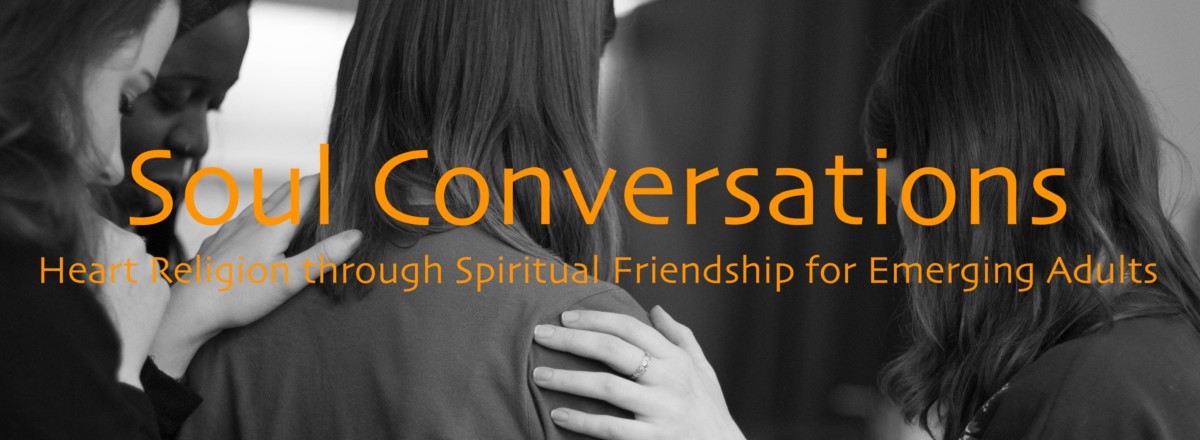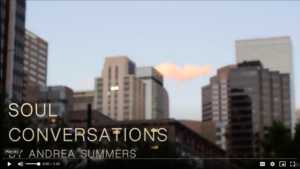Written by Andrea Summers
Dedicated to my spiritual friend, Sarah Jackson. She modeled Soul Conversations for me before that’s what they were called. Always guiding me toward God’s transformative love, Sarah inspired much of this project’s work.
Explanation of the Project
‘Heart religion’ stands at the very center of what it means to be a Wesleyan, which is why this project aims to see Southern Wesleyan University students engage more substantively in Christian community in ways that form and transform.
The Problem
The church, including Christian universities, paints an impressive picture of the impact community can have on our lives and on the world around us. There is a great deal of talk around communing with God, but very little understanding of how to lean in to a deep knowing of God. There is much attention given to hearing from God, but great confusion around discerning God’s voice. There is considerable energy given to cultivating Christian community, but very few people who feel truly known. While the church sells 21st century discipleship forms as the answer to our spiritual deficiencies, and while these do spur us on to greater growth, they also fall short of the deep dependence on the Holy Spirit and the authentic vulnerability necessary for inner transformation toward holy love.
Young people are disappointed with and perhaps even desensitized by the Christian community they have been promised.
When seventy-three SWU students from various disciplines populating General Education courses were asked about prior discipleship opportunities, here’s what they had to say.
- 70% said: I feel disappointed by my discipleship experiences
- 75% said: I long for authentic relationships with other Christians, but have had trouble finding them in groups designed for spiritual growth.
Inspired by sermons about authentic community, people of faith sign up for groups that underdeliver; groups whose structure, purpose and leadership are ill-equipped for fostering the kind of relationships that encourage deep heart transformation.
The Project
Therefore, a guide called Soul Conversations has been created and implemented which incorporates the following.
- HISTORICAL THEOLOGY:

- John Wesley’s doctrines, disciplines and dispositions of the heart – Wesley taught that there are moments and seasons when doctrine and dispositions are not enough because the very orientation of our heart needs to be transformed, and this is something that no amount of mental acquiescing and fist clenching can accomplish. This is where Wesley’s affections or dispositions of the heart come in to play.
- Aelred of Rievaulx’s spiritual friendship – Aelred understood community to be sacramental, a “channel of grace created by God, drawing humans to God and joining them together in his presence.”¹
- METHODOLOGY:
- Wesley’s structured Christian conferencing – with special attention to his band meetings. Wesley taught that these patterns of communal action create openings in our lives where the grace, mercy, and the presence of God not only becomes known to us but transforms us. Band membership meant vulnerability at the deepest level and trusting that those who know your sin will still love you as Christ loves you.
- The monastic tradition’s spiritual direction – This art of Christian guidance listens deeply to another person’s life story with an ear for the movement of the holy. There is a listening for, not just the practical details of life but the stream beneath it all consisting of our deepest longings, motivations, hopes and fears.²
So many of the opportunities for transformation afforded by the modern church are rooted in believing correctly or behaving rightly. But seldom established in the rhythm of the church are opportunities to surrender to God’s grace in ways that allow the longings of our hearts to be transformed.
This guide for Soul Conversations is a 21st century application of these historic theologies and practices which offer the authentic spirituality that emerging adults are open to and longing for.
Introduction to Ministry Context
 Southern Wesleyan University is a private, nonprofit, Christian, liberal arts university located in Central, South Carolina with strong ties to the Wesleyan denomination. The university serves approximately 1,600 students³ , just over half of those are enrolled as residential students at the 250-acre main campus in Central, South Carolina. SWU is ranked in the top two private colleges for diversity in the state of South Carolina and ranks in the top five among Christian colleges in the southeast.4
Southern Wesleyan University is a private, nonprofit, Christian, liberal arts university located in Central, South Carolina with strong ties to the Wesleyan denomination. The university serves approximately 1,600 students³ , just over half of those are enrolled as residential students at the 250-acre main campus in Central, South Carolina. SWU is ranked in the top two private colleges for diversity in the state of South Carolina and ranks in the top five among Christian colleges in the southeast.4
Southern Wesleyan University is a “Christ-centered, student-focused learning community devoted to transforming lives by challenging students to be dedicated scholars and servant-leaders who impact the world for Christ.”5 SWU wants to see students grow spiritually and embody the character of Christ and is committed to helping students integrate faith, living and learning into their education.6 While students do not need to identify as Christians to attend, and some do not, most students profess some degree of Christian belief.
Soul Conversations Guide
I have taken what I learned from my research and from my own ministry experience to develop a guide for cultivating spiritual friendship and creating space for transforming the dispositions of our hearts.
The ‘secret sauce’ of Soul Conversations is inspired by Wesley’s highly structured Christian conferencing. But inside that structure there is opportunity for tremendous freedom and openness to the Holy Spirit, which is inspired by Spiritual Friendship and Spiritual Direction of the monastic tradition.
Below are some characteristics of that structure.
-
- Groups of 3-4 individuals
- The guide includes five simple steps:
- Centering
- Listening to scripture
- Focused Prayer
- Reflection
- Blessing
- Every step of the guide is timed (ie. with a stopwatch!)
- The focus is not bible study or behavior modification, but listening to God and listening to one another.
- The expectations are
- Confidentiality
- Honesty & vulnerability
- Consistency
- No advice giving or ‘that reminds me of…’ careless sharing
- Keeping the time
- Incorporation of listening prayer and discernment
There is a clearly defined space where authentic vulnerability and a growing dependence on the Holy Spirit opens Christians up to God’s grace to transform the dispositions of our hearts.
It is about listening carefully and deeply to one another and to God. The goal of soul conversations is not to answer all of life’s questions, but to draw closer to God amid the questions.
Research Process
Four separate Soul Conversation groups met for an entire semester. Populated by students who shared a desire to grow closer to God and closer to one another, fourteen individuals all reported growth in seven areas of Wesleyan distinctives.
Students expressed:
Spiritual growth was measured in two ways.
-
- First, students were given an identical, fifty-question survey both before and after a semester of Soul Conversations. The results are organized into seven marks of the Wesleyan tradition7 that I believe Soul Conversations foster.
- Second, students were interviewed after meeting in Soul Conversation groups for a semester and asked qualitative questions in order to elicit a more narrative snapshot of their experience.
Interpretation: Findings
An abbreviated summary of findings for the fifty-question survey is below. These show change from:
(1) before Soul Conversations => (2) after a semester of Soul Conversations.
Human Freedom
I partner with God in order to cope with daily problems: 60% => 90%
Corporate Spiritual Practices
I experience meaningful corporate prayer at least 1/week: 60% => 90%
I experience corporate confession at least 1/month: 40% => 100%
I seek guidance from other Christians: 40% =>90%
Sanctification
I regularly receive/experience God’s grace through community: 60% => 100%
I experience a growing in love for God: 80% => 90%
I experience a growing obedience to God: 80% => 100%
Transformative Relationships
I have a spiritual friend: 70% => 100%
I share vulnerably/authentically at least once a week: 40% => 70%
Spiritual friendships have helped me grow closer to God: 80% => 100%
The Role of the Holy Spirit
I am aware of God’s presence: 40% => 90%
I rely on the Holy Spirit for guidance: 40% => 90%
Religious Affections or Dispositions of the Heart
I experience God changing my heart in ways I could not 1/mo: 30% => 90%
Eschatalogical Optimism
The best years of my life are ahead of me: 50% => 90%
* An abbreviated summary of the qualitative survey results can be found here.
Limitations and Summative Reflection
 Soul Conversations is a practice that carries a tremendous amount of promise. Similar to the way that spiritual friendship in Aelred of Rievaulx’s day and Christian conferencing in John Wesley’s day were antidotes for nominal Christianity, I believe that Soul Conversations is a Wesleyan expression of social holiness fit for the 21st century. The practice is not without its limitations, however. And its greatest limitation is evidenced in this study.
Soul Conversations is a practice that carries a tremendous amount of promise. Similar to the way that spiritual friendship in Aelred of Rievaulx’s day and Christian conferencing in John Wesley’s day were antidotes for nominal Christianity, I believe that Soul Conversations is a Wesleyan expression of social holiness fit for the 21st century. The practice is not without its limitations, however. And its greatest limitation is evidenced in this study.
Perhaps the greatest hurdle for Soul Conversations is its initial attrition. That is, 46% of the students who indicated an interest in being a part of Soul Conversations never met for an initial group conversation. But it is also interesting that the attrition rate from students who met for their first conversation and students who continued meeting for the entirety of the semester was zero percent.
Not one student, who hurdled the obstacles of initial commitment, left Soul Conversations. Put another way, the retention rate of Soul Conversations was 100%. In fact, every single participant made it to every single weekly gathering for the entire semester. Attendance at these weekly Soul Conversations was one-hundred percent.
While typical small groups tend to ease people into community with low commitment and low risk, Soul Conversations asks people to do quite the opposite. The church has bought in to our culture’s hyper-individualism and on-demand expectations. In a culture where anything can be returned and everything comes with a no-money-down-risk-free trial, calling Christians to the deep, slow work of heart change is a difficult sell. And how can Christian practitioners, who have not done this careful, discerning labor of love themselves, call or inspire their people to it?
The church wants plug-and-play discipleship methods and Soul Conversations will not fit the bill.
If contemporary small groups are a gradual slide into community, Soul Conversations means jumping into the deep end. Ben used this analogy first, when he shared, “If the whole process of relating with God and other people is swimming… then [Soul Conversations] is jumping in.”
If efficiency is measured by creating large-scale programs that can accommodate tremendous numbers of people at a time, then Soul Conversations will never be efficient. But if efficiency is measured by covering tremendous spiritual ground in a structured and Spirit-centered way, then perhaps it is. I found it fascinating that three students chose to use the word ‘efficient’ when describing Soul Conversations because of the spiritual ground they were able to cover in a concentrated amount of time. Perhaps in this way Soul Conversations are efficient, but they are not easy.
Soul Conversations represent a Wesleyan understanding of the Christian life. Yet, stepping into this space is not for the faint of heart. It requires a desire to do something painful, an awareness of the brokenness we are in, and a desire for the beauty that is on the other side.
Some call this tension holy desperation. Student Paige Rouse put it better than I could, when she stated simply, “I think Soul Conversations are the birthplace of revival. I’ve experienced this in my own life. I will continue to do Soul Conversations for the rest of my life, period.” Perhaps Paige is on to something. Aelred of Rievaulx brought tremendous renewal to his Abbey. Wesley brought unprecedented renewal to 18th century England. Renewal movements, throughout history, have had little room for nominal Christians. No doubt, I stumbled on to Soul Conversations out of a desire for personal renewal in my own life, and continue to find it there.
Despite the somewhat unwieldy and non-attractional nature of Soul Conversations, I cannot give up on them. As I sat in room 202 in Nicholson-Mitchell and listened to students articulate the impact that Soul Conversations had on their lives over the course of only one semester, I was in awe.
Tears streamed down several students faces as they expressed a love for God and a love for others that they had never known.
Without fail, student after student shared the way their longing for more of Christ was met in profound and unexpected ways. Students talked about an explosion of discernment, not having been able to see God anywhere to suddenly seeing God everywhere.
As I write this last section, a new semester has started. I have not promoted Soul Conversations on campus or invited any students into Soul Conversations, as I did last semester. And yet, all the groups that were a part of this study continue. In addition, seven new groups are forming; four groups including fifteen men and three groups including nine women. One of these is a group of young men on the university’s baseball team.
Students are sharing their transformative experiences with other students and word is spreading.
They reach out to me and ask me how to start their own group. I was meeting with one young woman and simply walking her through the guide, explaining the structure and process. I looked up to see tears streaming down her face. “I have been longing for this for such a long time,” she barely whispered.
The limitations of Soul Conversations reflect, perhaps, the greatest obstacles to spiritual transformation itself. We like the idea of being on a journey of faith if it does not require too much faith.
We dream of the promised land, but refuse to leave our current comfort. We want to make room for God if it does not impact our overcrowded calendars. We want to know ourselves as long as we do not see anything ugly. We love celebrating the resurrection if we do not do any dying. We make plans to save up for the pearl of great price so long as we do not have to sell everything we have.
The reality is that spiritual transformation together in Christ’s presence for the sake of others is missing in so many people’s experience of church discipleship. And while Soul Conversations is not the only answer to this longing at the heart of some Christians (and dare I say non-Christians) today, it is a promising, faithful, Wesleyan practice that puts us in a place to receive God’s transforming grace.
[1] Dutton, “The sacramentality of community,” 246. [2] William Francis Barry and William J. Connolly. The Practice of Spiritual Direction. (New York: Seabury, 1982). 21. [3] ”SWU Profile,” Southern Wesleyan University, accessed July 12, 2019, https://www.swu.edu/about/who-we-are/swu-profile/ [4] ”2020 Most Diverse Colleges” Niche, accessed July 12, 2019, https://www.niche.com/colleges/search/most-diverse-colleges/s/south-carolina/ [5] “Mission and Values,” Southern Wesleyan University, accessed [July 12, 2019] from http://catalog.swu.edu/content.php?catoid=11&navoid=580#mission-and-values [6] “Life at SWU,” Southern Wesleyan University, accessed July 12, 2019, https://www.swu.edu/life-at-swu/. [7] I do not have any one or two sources for this. These are distinctives arrived at after several years of reading on Wesleyan theology and praxis and are a result of my critical thinking and deductions. However, I believe they hold up well to scrutiny.
Banner image: Photo by Rosie Fraser on Unsplash
All other images: Chandler Myers
Videos produced by: Chandler Myers




Andrea,
Thank you for this. It is refreshing to hear how God is using you on the camp SWU. You are a wonderful teacher. I know this from the first time I heard you teach on justice at the Mississippi Annual Conference. I have been blessed by you throughout this program. You have such a way with words that is just fun to listen too. I know that there have been challenges to some of the things you are doing; however, it is clear to me that you are making a deep impact on the lives of students there. I pray a blessing upon you and your work in the future and look forward to implementing these principles by inviting people to participate in Soul Conversations. The fact that 100% that started have stuck with it and continued to meet. How has COVID-19 impacted these groups? Are students still finding ways to meet virtually? I am sure this has affected the group dynamic in some way but I hope that the foundations are there that would allow these type of groups to persevere.
Grace and peace,
Eric Sanford
I am interested in finding out how this is continuing during this pandemic.